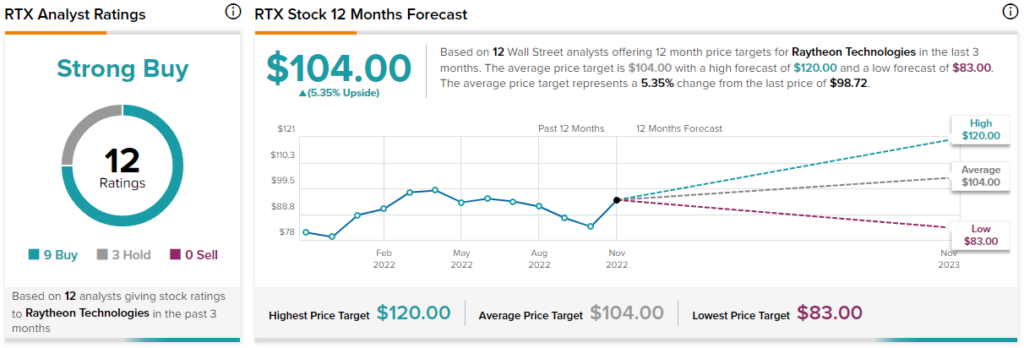The war in Ukraine and growing tensions with China have pulled defense stocks into the limelight, making the S&P Aerospace & Defense Select Industry Index hold up better than the S&P 500 (SPX) year to date. In this piece, I compared two defense stocks, LMT and RTX, and found that LMT is likely a better buy. Lockheed Martin (NYSE:LMT) and Raytheon Technologies (NYSE:RTX) are up nicely year-to-date, even significantly outperforming their sector. However, no two defense stocks are the same, even though they might share similarities.

For example, both companies have significant institutional ownership, with Raytheon at 81% and Lockheed at 76%, a sign of strength for both. On the other hand, almost all of Lockheed’s sales are defense, while Raytheon is 65% defense and 35% commercial aviation. This could make all the difference when choosing between two names.
Lockheed Martin (LMT)
Lockheed Martin shares are up almost 40% year to date, putting them significantly ahead of Raytheon stock. However, from a P/E standpoint, Lockheed is cheaper. After a deeper analysis of both companies’ fundamentals and due to its lower P/E, Lockheed Martin looks like the better choice, making a bullish view seem appropriate at this time.
In its 2022 review of the global aerospace and defense industry, PwC reported a partial recovery of the industry in 2021, led by Boeing (NYSE:BA), Airbus (OTC:EADSF), and Raytheon. However, Lockheed Martin remained the largest, most profitable company in the industry, with revenue up 3% to $67 billion and operating profits up 6% to $9.1 billion.
Lockheed Martin is almost entirely dependent on the defense industry and especially the U.S. government for its sales, which is a double-edged sword. However, global military spending reached a new record in 2021, and the U.S. boosted its defense budget by 8% for Fiscal 2023, setting Lockheed up for a robust year.
Finally, Lockheed’s trailing P/E ratio of around 22.2x is lower than the American aerospace and defense industry’s three-year average of 27.9x. It also doesn’t account for the increasing military spending and growing tensions with Russia and China.
What is the Price Target for LMT stock?
Lockheed Martin has a Hold consensus rating based on four Buys, seven Holds, and two Sells assigned over the last three months. At $471.67, the average price target for Lockheed Martin implies downside potential of 2.8%.

Raytheon Technologies (RTX)
In the long term, things are looking up for Raytheon, especially as it benefits from the recovery in both defense and commercial aerospace. However, the company’s P/E ratio of 32.5x is slightly ahead of the industry’s three-year average, and a closer analysis of its growth shows there’s more than meets the eye. Combined, these factors suggest a neutral view may be appropriate.
As mentioned earlier, the good news for Raytheon is that it’s benefiting from the recoveries in both commercial aerospace and defense. According to PwC, commercial aerospace deliveries are up with a strong backlog, and passenger demand is in recovery mode. The firm thinks commercial aviation could soar again by 2024, which would benefit Raytheon.
However, PwC also pointed out something critical about the company’s fundamentals. Raytheon’s merger with United Technologies impacted its earnings reporting, making its numbers look better than they actually were.
Raytheon reported a 13% increase in revenue for 2021. However, after adjusting for the merger with United Technologies that was completed in the second quarter of 2020, Raytheon’s 2021 revenue was roughly flat. The company reported $5 billion in profits for 2021 versus its loss of $11.9 billion in 2020. The merger’s impact on Raytheon’s profits was much smaller, at about $600 million, but it’s still something to consider.
What is the Price Target for RTX stock?
Raytheon Technologies has a Strong Buy consensus rating based on nine Buys, three Holds, and zero Sell ratings given over the last three months. At $104, the average price target for Raytheon Technologies implies upside potential of 5.35%.

Conclusion: Bullish on LMT, Neutral on RTX
The biggest risk facing both companies is the continuing supply-chain difficulties, which are restraining their revenues and ability to fill orders. Raytheon and Lockheed’s management both highlighted manufacturing challenges as key issues for the rest of this year and into the next.
Although Lockheed Martin shares have surged much more than the rest of the industry year-to-date, they should still have room to run. Overall, the defense industry has had stable, steady growth in recent years, and global tensions suggest continued growth. Aerospace is still in recovery mode but looks robust in the long term, making Raytheon worth monitoring for the long term while potentially buying and holding Lockheed Martin.









